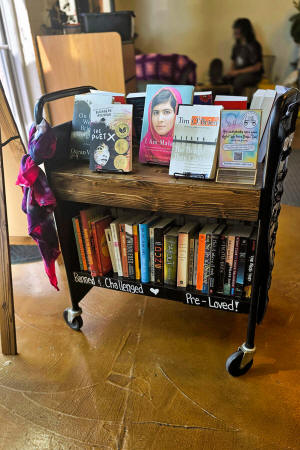A wave of new owners brings fresh energy to independent bookselling
[May 23, 2025]
By HILLEL ITALIE
NEW YORK (AP) — Amber Salazar is the kind of idealist you just knew
would end up running a bookstore — a lifelong reader who felt angered
“to the core” as she learned of book bans around the country.
A resident of Colorado Springs, Colorado, Salazar last year opened
Banned Wagon Books, a pop-up store she sets up everywhere from wineries
to coffee shops, featuring such frequently censored works as Maia
Kobabe's “Gender Queer,” Angie Thomas' “The Hate U Give” and Toni
Morrison's “Beloved.”
“I decided that no matter what it looked like, I was going to open a
bookstore so that I could contribute in some small way and stand up for
intellectual freedom in the U.S.,” explains Salazar, 33, who donates 5%
of her profits to the American Library Association and other
organizations opposing bans. “Since we were coming out of the pandemic
at that time, I started thinking about ways to combine my love of
literature and passion for intellectual freedom with my appreciation for
the small businesses in my city who weathered some difficult storms
through shutdowns and supply chain concerns.”
Salazar is among a wave of new — and, often, younger — owners who have
helped the independent book community dramatically expand, intensify and
diversify. Independent bookselling is not a field for fortune seekers:
Most local stores, whether run by retirees, bookworms or those switching
careers in middle age, have some sense of higher purpose. But for many
who opened in recent years, it's an especially critical mission.
Narrative in Somerville, Massachusetts, identifies as “proudly
immigrant-woman owned & operated, with an emphasis on amplifying
marginalized voices & experiences.” In Chicago, Call & Response places
“the voices of Black and other authors of color at the center of our
work.”
Independent stores will likely never recover their power of 50 years
ago, before the rise of Barnes & Noble superstores and the online giant
Amazon.com. But the days of industry predictions of their demise seem
well behind. In 2016, there were 1,244 members in the American
Booksellers Association trade group, at 1,749 locations. As of this
month, the ABA has 2,863 individual members, at 3,281 locations. And
more than 200 stores are in the process of opening.

“It’s incredible, this kind of energy,” says association CEO Allison
Hill, remembering how, during the pandemic, she feared that the ABA
could lose up to a quarter of its membership. “I don’t think any of us
would have predicted this a few years ago.”
Hill and others acknowledge that even during an era of growth,
booksellers remain vulnerable to political and economic challenges.
Costs of supplies remain high and could grow higher because of President
Donald Trump’s tariffs. ABA President Cynthia Compton, who runs two
stores in the Indianapolis area, says that sales to schools are down
because censorship laws have made educators more cautious about what
they purchase.
[to top of second column]
|

This photo provided by Amber Salazar shows the pop-up bookshop
Banned Wagon Books at Dynamo Coffee Roasting Co., March 30, 2025, in
Colorado Springs, Colo. (Amber Salazar via AP)
 The ABA’s own website advises:
“Passion and knowledge have to be combined with business acumen if
your bookstore is to succeed.”
Salazar herself is part of an Instagram chat group, Bookstores
Helping Bookstores, with such like-minded sellers as the owners of
The Crafty Bookstore in Bloomington, Indiana, “specializing in Indie
books & custom bookish accessories,” and the Florida-based Chapter
Bound, an online store with a calling “to connect great books with
great people — at prices everyone can afford.”
“In the age of social media, people are craving genuine connection
and community,” Salazar says. “And books often provide a catalyst to
that feeling of community.”
Stephen Sparks, who is 47 and since 2017 has owned Point Reyes Books
northwest of San Francisco, believes that the pandemic gave sellers
of all ages a heightened sense of their role in the community and
that the return of Trump to the White House added new urgency. Sales
are up 20% this year, he says, if only because “during tough times,
people come to bookstores.”
The younger owners bring with them a wide range of prior experience.
Salazar had worked in retail management for nine years, switched to
property and casualty insurance sales “in search of advancement
opportunity” and, right before she launched her store, was a
business process owner, “a blend of project management, customer and
employee experience management.”
Courtney Bledsoe, owner of Call & Response, had been a corporate
attorney before undertaking a “full career shift” and risking a
substantial drop in income. The 30-year-old held no illusions that
owning a store meant “pouring a cup of coffee and reading all day.”
Calling herself “risk averse,” she researched the book retail
business as if preparing for a trial, before committing herself and
launching Call & Response in May 2024.
“This endeavor is probably the hardest thing I have ever done in my
life,” she says, acknowledging it could take a couple of years
before she can even pay herself a salary. “We're just doing this to
serve the community, doing something we love to do, providing people
with great events, great reading. It's been a real joy.”
All contents © copyright 2025 Associated Press. All rights reserved |